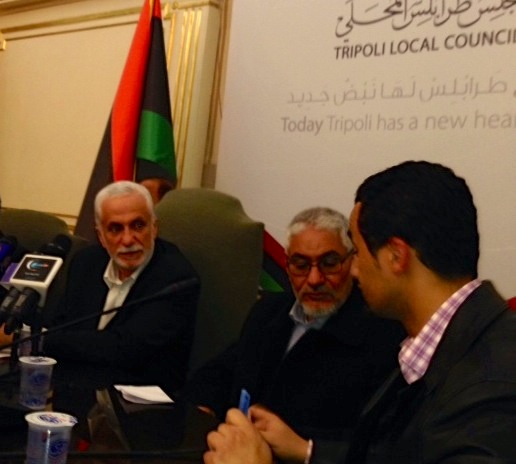By Libya Herald staff.

Tripoli, 21 November 2013:
The head of Tripoli Local Council, Sadat Elbadri, has said that the strike in the . . .[restrict]capital that started after last Friday’s massacre in Gharghour will continue until GNC decisions Nos. 27 and 53 are implemented and all militias had left the capital.
Speaking at a press conference this evening, he said that, despite today’s departures, over a thousand military formations remained in the capital. These all had to go, he said. Tripoli militias too had to cease to operate. The only acceptable security forces were the army and police.
“These are hard times. We need support and confidence from the people,” he added.
Also at the press conference were a number of civil society leaders in the capital who backed his call.
Mohamed Al-Qwaif, representing the Greater Tripoli Area Residents Group, said that locals would continue peaceful protests “until the last militia leaves”.
He attacked the government which, he claimed, had until the massacre ignored Law 27 ordering militias out of the capital. He also criticised the Prime Minister’s initial attack on Elbadri after the massacre when he accused him of organising the protest. The government had been well aware of it in advance, Qwaif said; the Interior Ministry had authorised it.
The government had to investigate the massacre and punish the criminals responsible, he insisted.
Mohamed Drah, President of the Students’ Union at Tripoli University, said that the strike there would continue until all militias left the capital – “with no exceptions”. He said the big brigades had left because the government had put pressure on them. But there were plenty of small ones remaining. There were 100 formations in Janzour and more than 80 in Busleem. All had to go.
Moreover, he asked, where was that pressure to force the brigades to leave before last Friday.
He demanded to know why the government had not protected the protestors and why had it initially accused them of carrying weapons.
There was a lot of pressure on the students to give up their strike, he stated. The Prime Minister had been to visit the university to ask them to return to work. However, he accused Ali Zeidan of “just talking”.
“We’re not going back,” he said. The students union had met with deans and other student representatives and there would be a further meeting on Saturday to see if Law 27 was being implemented. “We even don’t have security in the university”, he said. “How can we study in such a situation?”.
He said he was confident the militias would go, he told the Libya Herald. There were signs too, he said, that the lead being taken by Tripoli against the militias was being copied elsewhere. There had been consultations with civil groups in Benghazi, he said. “They’re going to protest there.”
The head of the Dawa Islamiya (the Islamic Call Society), whose Tripoli headquarters was handed over by Zintan’s Sawaq Brigade today, complained that that his organisation had not been party to any negotiations and that the premises had not been given back to it.
The press conference was broadcast live on a screen in Algeria square. Around 200 protestors had gathered to hear Elbadri’s speech after the much talked withdrawal of some brigades from Tripoli. The response to the statements by officials was very emotional as people waited to hear official reports on the developments.
The crowd watching the press conference responded with Takbir (Allahu Akbar) when Mohammed Drah spoke of his clear cut message to the Prime Minister. “We will not stand with anyone that doesn’t stand for the country”, Drah said.
There were arguments between protestors as some tried to defend the actions of the Prime Minister. One protestor who lost his brother last Friday had to be taken away as he broke down when Al-Qwaif demanded an inquiry into the killing of protestors. Some protestors were unhappy with others criticising Ali Zeidan and loudly complained that the event was turning into an attack on him.
With input from Aimen Eljali and Umar Khan [/restrict]







